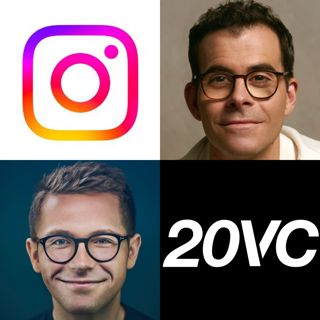
20VC: Instagram CEO, Adam Mosseri on Threads: The Journey from 0-100M Users; What Worked, What Didn't and the Plans Ahead | Instagram: Biggest Mistakes, Successes, Misconceptions, TikTok Competition & The Future of Social Media; Interest Graph or Friend G
Adam Mosseri is the Head of Instagram, where he is responsible for overseeing the engineering, product, and business teams and leading Meta’s efforts on creators and Reels. Adam has been at Meta for more than fifteen years. He started at Meta as a designer for Facebook's mobile app before moving to product management, where he led the Facebook News Feed product and engineering teams, and served as the Head of Facebook News Feed. Adam began his career founding a design consultancy focused on graphic, interaction, and exhibition design before joining TokBox as the company’s first designer. In Today's Discussion with Adam Mosseri We Discuss: 1. From Designer to Product Leader to Instagram CEO: What did Adam learn from his first job bartending? How did it impact his approach to customer support and research? What are the top 1-2 pieces of advice Adam would give to someone wanting to make the move from individual contributor to leader? If Adam was "not amazing at anything", what did he do that enabled him to rise above the rest and become CEO of Instagram? What have been 1-2 of the biggest lessons from working with Mark Zuckerberg for 15 years? 2. A Deep Dive on the Wild Times as Instagram CEO: What has been Adam's single biggest mistake as CEO of Instagram? What does Adam believe is the least known feature within Instagram that has made them successful? What does Adam believe has been the biggest product decision he has made as CEO? Why does Adam believe that Instagram is too complicated as a product? Who does Adam believe is the most formidable competitor to Instagram? Was Instagram Reels a simple copy of TikTok? What have Instagram learned from TikTok? How does Adam respond to the statement that Instagram is a "copy-cat machine" and lacks innovaton? 3. Threads: The Journey from 0-100M Users in Three Days: Did Adam and the team expect the response they got to Threads? Why did they decide to break Threads out into a separate app? What went into bootstrapping the Threads friendship and interest graph? What was the Threads influencer activation strategy? What worked? What did not? Did they pay influencers? How did they choose which verticals to focus on? What is Adam's core focus with Threads today? How is the team analysing and measuring retention? What are their goals? What are the 1-2 core reasons why Threads would not work? How do they aim to prevent them? In 12 months, where will Threads be? 4. The Future of Consumer Social: What Happens Now? Does Adam believe we have seen the transition from the social graph to the interest graph? Is it that binary? Is it possible to have both the interest and the friendship graph all in one app? How does the monetization potential differ when comparing Threads (text) to Instagram (visual)? How important is it for the next consumer social platforms to have stars that are native to their platform (Mr Beast on Youtube, D'Amelio on TikTok etc.)
24 Jul 20231h 10min
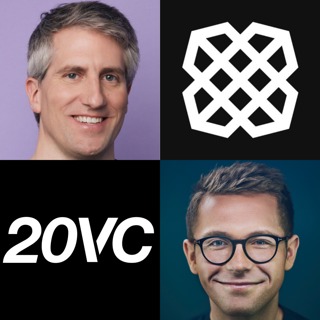
20VC: Why Hiring in Tech is Broken and Founders Need to be as Good at Firing as they are Hiring, Why Product Differentiation is Unsustainable & Why the Current Generation of Tech Employees are Entitled and What Needs to Change with Jean-Denis Greze @ Plai
Jean-Denis Greze is Chief Technology Officer at Plaid where oversees global product business units across North America and Europe. Prior to joining Plaid, Jean-Denis was Director of Engineering at Dropbox. Jean-Denis is also a prolific angel investor with a portfolio including the likes of Nex Health, Merge.dev and Rupa Health to name a few. In Today's Episode with Jean-Denis Greze We Discuss: 1. The Journey to One of the Most Powerful CTOs: How JD made his way into the world of tech with his first role at Dropbox? How does JD analyse a Linkedin CV today? What are the signals of outperformers? What does JD know now that he wishes he had known when he started in tech? 2. Hiring the Best: 101: What are JD's single biggest lessons on hiring the best talent? What have been some of JD's biggest hiring mistakes? Why does JD believe founders need to be as good at firing as they are hiring? Does JD believe people can scale with the scaling of a company? If they do not scale, do you layer them or do you let them go? How does JD determine whether to bring in an external candidate vs promote someone from within? 3. Product Differentiation is not Sustainable: Why does JD believe that product differentiation is not sustainable? Why is UX as a moat BS? How does this lead JD to suggest Salesforce is a short in the public markets? Why does JD believe that Snowflake is also a short? What does Snowflake teach us about the different stages of product market fit? What are the biggest mistakes founders make when analyzing product market fit? 4. Remote Work, Titles and Entitlement: Why does JD believe most tech employees treat their employer in the same way French citizens treat the French government? How does JD analyse the impact of remote work on both productivity and culture? Why does JD believe titles are BS in the beginning but matter with scale? Why does JD believe that you should not hire for the long term?
21 Jul 202350min
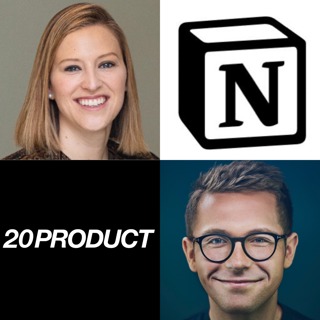
20Product: The Secret to Successful Onboarding from Notion and Airtable, The Biggest Mistakes Startups Make in PLG Today& Why 90% of Onboarding Today is Done Poorly with Lauryn Isford, Head of Product Growth @ Notion
Lauryn Isford is the Head of Product Growth at Notion, managing Notion's product-led growth engine and self-serve business. Before Notion, she led growth at Airtable, and previously worked on growth teams including Meta, Dropbox, and Blue Bottle Coffee. Lauryn is an active angel investor and advisor supporting companies building product-led go-to-market motions. In Today's Episode with Lauryn Isford: 1. From Blue Bottle to Airtable and Notion: How did Lauryn first make her way into the world of product and growth? What are 1-2 of her biggest takeaways from Dropbox, Facebook and Blue Bottle? What does Lauryn know now that she wishes she had known when she started? 2. What is Growth: 101: How does Lauryn define growth? What is it not? When is the right time to make your first growth hire? What profile should your first hire in growth be? What are the single biggest mistakes founders make when hiring growth teams? 3. Mastering the Onboarding Experience: What are the core elements of a successful onboarding experience? How important is time to value in onboarding today? What are the biggest mistakes product teams make in company onboarding? What is the most effective onboarding technique and workflow in PLG today? Why are 90% of current onboarding's done badly? 4. Making Growth work with the Rest of the Org: What are the single biggest barriers to growth and product working together well? What can leaders do to make their growth teams work well with product teams? How can growth teams experiment and test with product without messing up codebases?
19 Jul 202347min
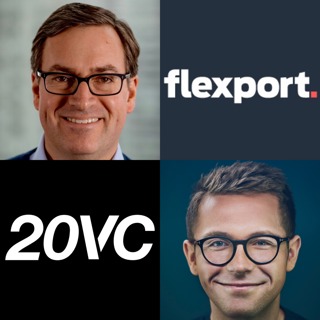
20VC: Top Three Lessons from Working with Jeff Bezos for 23 Years at Amazon, How the Best Leader Hire, Fire, Prioritise and Make Decisions & How to Be Responsible for 1M Employees and Be a Rockstar Husband and Father with Dave Clark @ Flexport
Dave Clark is the CEO of Flexport, the global freight forwarder and logistics platform that has now raised over $2.5BN to build the category leader. Prior to Flexport, Dave began his career at Amazon in 1999 as an Operations Manager, working his way up to become the CEO of Amazon’s worldwide consumer business in 2021. By the time Dave left, he was responsible for over 1 million employees. Dave spearheaded the launch of Amazon Robotics and grew the company’s logistics divisions to include Amazon’s own planes, trailers, and last-mile delivery vehicles through Amazon’s own delivery network (which today ships more packages than FedEx and UPS). Huge thanks to Ryan Peterson for some amazing question suggestions today. In Today's Episode with Dave Clark We Discuss: 1. From Operations Manager to CEO @ Amazon: How did Dave Clark make his way into the world of startups with Amazon in 1999? What are 1-2 of his biggest lessons from spending 23 years at Amazon? What are 1-2 of his biggest takeaways from working alongside Jeff Bezos for 23 years? 2. How Big Leaders Make Big Decisions: What is Dave's decision-making framework when it comes to big decisions? What is the biggest decision Dave made that went wrong? How did it impact his mindset? How does Dave think through prioritisation as a leader today? What are the biggest mistakes founders make when it comes to focus? 3. How Big Leaders Hire Big Talent: What are 1-2 of Dave's biggest lessons on what it takes to acquire the best talent? Does Dave believe that people can scale with the scaling of the company? How does Dave think through the challenge of promoting internally vs bringing in external talent? Why does Dave like to hire people straight out of college? What are the benefits? 4. How Big People Deal with Big Problems: Kids, Money and Ego What are 1-2 of Dave's biggest lessons when it comes to parenting? How does Dave think about giving his kids the same hunger and ambition, when they are brought up in such affluent environments? How does Dave assess his own relationship to money? How has it changed over time? What does a truly great marriage mean to Dave? Where do so many go wrong in trying to find work-life balance?
17 Jul 202343min
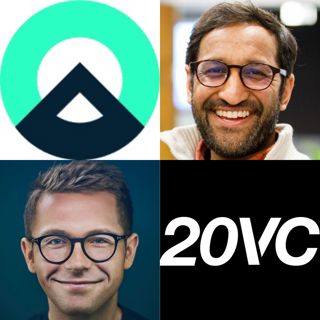
20VC: Why Fund Sizes Should Be Smaller, Should Founders Also Have Their Own Funds, Is Emerging Markets Investing Gone, Is Fintech Investing Dead & Who Will Be The Winners and Losers in VC in the Next 10 Years with Sheel Mohnot, Co-Founder @ BTV
Sheel Mohnot is a Co-Founder and General Partner @ Better Tomorrow Ventures, a $225M fund that leads rounds in pre-seed and seed-stage fintech companies globally. Sheel and Jake (his co-founder) invested for many years together before founding BTV and wrote checks into Mercury, Flexport, Ramp, and Hippo Insurance to name a few. As for Sheel, before BTV he ran 500 Fintech for close to 7 years, and before that was a founder, founding two companies, both of which were acquired. In Today's Episode with Sheel Mohnot We Discuss: 1. VC Needs to Change: Why does Sheel believe that VCs should have smaller funds? What are the biggest misalignments between founders and VCs today? What are the biggest points of friction between VCs and their LPs today? 2. VC in 10 Years Time: Who are going to be the winners in venture in 10 years time? Who are going to be the losers? Will micro-funds be bigger or smaller as a segment of the ecosystem? Will solo-GPs be bigger or smaller? Were they a zero-interest rate phenomenon? 3. The Errors of a Bull Market: What does Sheel believe are the single biggest mistakes made by VCs between 2020-2022? Did Sheel take liquidity off the table in the last few years? What have been some of his biggest lessons on when to sell? How does Sheel evaluate the flood of capital into emerging markets in the bull market? What happens now? Fintech is also experiencing the same challenging time, how does Sheel assess what is happening in the fintech financing market today? 4. Building a Fund: Lessons, Mistakes and Advice Scaling to $225M: What are the single biggest mistakes Sheel and Jake have made in the fun scaling? How has it impacted their mindset? What does Sheel know now about fund management that he wishes he had known at the beginning? What advice does Sheel give to emerging managers today, raising their first and second funds?
14 Jul 202349min
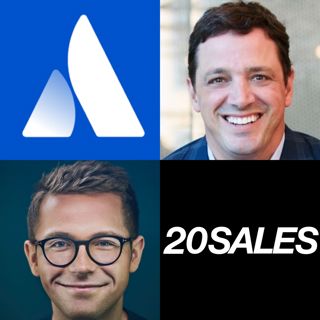
20Sales: Slack, Atlassian, Dropbox: Five of the Biggest Lessons on Starting, Scaling and Managing Sales Teams from 25 Years Leading the Best with Kevin Egan, Global Head of Enterprise Sales at Atlassian
Kevin Egan is the Global Head of Enterprise Sales at Atlassian and brings more than 25 years of enterprise sales experience and leadership to the company. Prior to his current role, Kevin served as the Vice President of North America Sales at both Slack and Dropbox and has held various senior sales leadership positions at Salesforce. In Todays Episode With Kevin Egan We Discuss: 1. The Makings of a Truly Great Enterprise Sales Leader: How did Kevin first make his way into the world of enterprise sales? What does Kevin know now that he wishes he had known when he entered sales? What advice would Kevin give to a new sales leader today starting a new role? 2. The Sales Playbook: How does Kevin define "the sales playbook"? Does the founder have to be the one to create the sales playbook When is the right time to hire your first salespeople? Should they be senior or junior first? What are the different types of reps to hire in the early days? Should you hire two at a time? 3. PLG vs Enterprise: Does Kevin believe it is possible to run both PLG and enterprise playbook at the same time? How does one know when they are ready to scale from PLG into enterprise? What are the signs? What do companies need to change in the way their sales team, is structured to make the transition from PMG to enterprise sales? What are the single biggest mistakes Kevin sees founders make in the scaling from PLG to enterprise? 4. Hiring the Sales Team: What non-obvious characteristics and attitudes should we look for in sales reps? How does Kevin structure the hiring process for all new additions to sales and revenue teams? What makes good PLG sales leaders? How are they different from enterprise sales leaders? What questions and case studies are most revealing for you in identifying them? What have been some of Kevin's biggest lessons on comp structure for these early rep hires? 5. Making the Machine Work: How does Kevin build trust with his early sales rep hires? What works? What does not? How does Kevin balance hitting the quarterly revenue target with longer-term pipeline strategy? How does Kevin manage when a quarter is missed? What is the right approach? How does Kevin approach post-mortems and deal reviews? How often? What do the best entail?
12 Jul 202336min
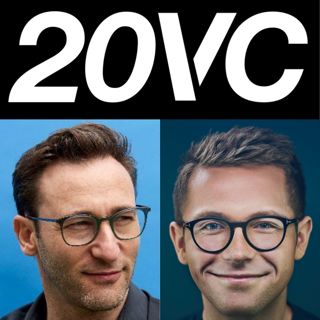
20VC: Simon Sinek on Trust; How it is Gained and Lost | Why Millennials Avoid Conflict | How to Listen Effectively | What Makes The Best Feedback and How to Provide It | Why Humans Do Not Change & How To Find Out Who You Really Are
Simon Sinek is an optimist and author, as we discuss in the show today. Simon is best known for his TED Talk on the concept of WHY (62M views), and his video on millennials in the workplace (80M views in 7 days). Simon is also a bestselling author including global bestseller Start with WHY, Leaders Eat Last and The Infinite Game. In addition, Simon is the founder of The Optimism Company, a leadership learning and development company, and he publishes other inspiring thinkers and doers through his publishing partnership with Penguin Random House called Optimism Press. In Today's Discussion with Simon Sinek We Discuss: 1. The Makings of Simon Sinek: In what ways does Simon believe that his parents and upbringing shaped who he is today? What does Simon want to be when he grows up? What was the catalytic moment to the "Simon Sinek brand"? When was that big break moment? 2. Identity: Simon has said before, "I define myself by who I am and not what I do". Is it wrong to define yourself by what you do? What do you do if you do not know who you are? What do you do if you do not like the answers to who you are? Is it possible to change who you are? What does that process look like? What is Simon's biggest advice to those looking to find a greater sense of self and identity? 3. Trust: Does Simon start relationships with inherent trust and it is there to be lost or no trust and it is there to be gained over time? When has someone broken Simon's trust? How did it impact how he approaches trust today? In the case of cheating in a relationship, does Simon believe it is possible to regain trust over time? Simon has said before, "trust is built on telling the truth". Does it ever make sense or is even right to tell a little white lie in a relationship? 4. Creating Safe Spaces: How can we create safe spaces for our partners to be their full selves? Does this differ professionally and personally? What are the biggest mistakes people make in building safe spaces? 5. Listening: What does great listening in a relationship mean? How can we do it better? Often people jump from listening to solution mode, is that wrong? Why does Simon have a rule of “no crying alone”. What does it do and how is it productive? When was the last time Simon cried? 6. Simon Sinek: AMA: What is success to you? Can one be “successful” and unhappy? What is the difference between happiness and joy?
10 Jul 202352min
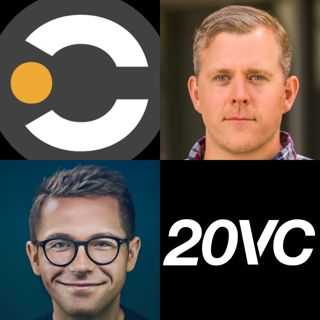
20VC: Why Data Size Matters More Than Model Size, Why The Google Employee Was Wrong; OpenAI and Google Have the Advantage & Why Open Source is Not Going to Win with Douwe Kiela, Co-Founder @ Contextual AI
Douwe Kiela is the CEO of Contextual AI, building the contextual language model to power the future of businesses. Last month Contextual closed a $20M funding round including Bain Capital, Sarah Guo, Elad Gil and 20VC. He is also an Adjunct Professor in Symbolic Systems at Stanford University. Previously, he was the Head of Research at Hugging Face, and before that a Research Scientist at Facebook AI Research. In Today's Episode with Douwe Kiela We Discuss: 1. Founding a Foundational Model Company in 2023: How did Douwe make his way into the world of AI and ML over a decade ago? What are some of his biggest lessons from his time working with Yann LeCun and Meta? How does Douwe's background in philosophy help him in AI today? 2. Foundational Model Providers: Challenges and Alternatives: What are the biggest problems with the existing foundational data models? Will there be one to rule them all? How does the landscape play out? Why does Douwe believe OpenAI's data acquisition strategy has been the best? 3. Data Models: Size and Structure: Why does Douwe believe it is naive to think the open approach will beat the closed approach? What are the biggest downsides to the open approach? Does the size of data model matter today? What matters more? How important is access to proprietary data? Are VCs naive to turn down founders due to a lack of access to proprietary data? 4. Regulation and the World Around Us: How does Douwe expect the regulatory landscape to play out around AI? Why is Europe the worst when it comes to regulation? Will this be different this time? How does Douwe analyse Elon's petition to pause the development of AI for 6 months? Do founders building AI companies have to be in the valley?
30 Jun 202342min






















